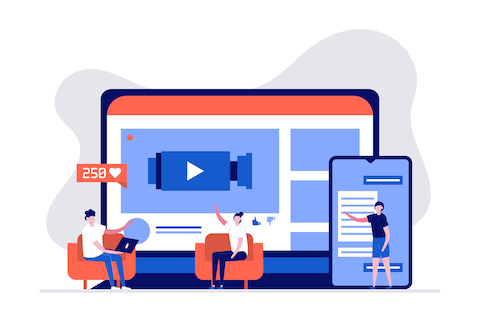Every year, it seems like THIS year will be the biggest year of change for PPC management, especially for B2B businesses.
But this year, this claim is more than hyperbole.
The growth in AI and a continued emphasis on data privacy are reverberating across our industry, leaving many advertisers wondering what to do in this time of change.
In this article, I’m going to outline three PPC strategies that your B2B business can use to navigate these changes and stay ahead of the curve in 2024.

3 PPC strategies to try in 2024
1: Use video marketing for more than brand awareness
Video continues to grow in importance as an asset for marketing and advertising campaigns. Whereas video may have been a “nice to have” before, it’s practically required in 2024.
We’re also expanding how we use video in advertising for our B2B clients. Previously, we primarily used videos to grow awareness.
We still do this, of course. Case in point: We recently re-engaged with a former client. Their prior ad agency focused narrowly on search keywords and conversions, doing little to build awareness. As a result of this approach, our former client had all but lost their branded search traffic and the precious leads that came with it.
When we took over the management of their account again, we set about turning this around.
The total monthly budget for this account is under $10k. We took a small amount of this budget to drive brand awareness. We created a $25 per day campaign budget for video ads, turning it off on weekends to make the budget go a little further.
After only two months, we’re already starting to see brand traffic trickle in again:

While video continues to work well for growing brand awareness, it’s also capable of doing much more.
For example, a client of ours has some wonderful video assets that showcase how their robotics products work. We started to use those videos in our advertising—and we are all very pleased with the low cost of impressions and the number of people who watch the entire video, click through, and then complete a form.
So not just brand awareness—but also conversions!
You can see in this screenshot how clicks and conversions increased over just a few months:

Video assets also lend themselves well to repurposing across your marketing and advertising channels. This is not a one-and-done asset!
2: Continue to test AI-powered campaigns and creative tools
As mentioned earlier, AI is having a profound impact on our industry—one that will only continue to grow.
Which brings us to the topic of Google Ads Performance Max campaigns.
Now stay with me… even if you tried PMax last year and decided to pause it, it might be time to test again.
That’s what my team and I are currently doing.
Without question, some of our B2B clients had issues with PMax last year, especially when it came to lead quality. In some cases, we decided that the low volume of leads and/or the poor ROI didn’t warrant us keeping PMax campaigns live.
But it’s a new year and a new opportunity to test these AI-driven ads again. We have more information about PMax today than we did before. I also have faith that Google is working to improve this campaign type, so it’s worth taking for another trial run.
Frankly, AI-powered campaigns are the way of the future. They’re not going anywhere. It’s worth getting on board early so that you can get the best out of these campaigns as they develop. And if your competitors resist, that creates new opportunities for you.
On a related topic: This is also the right time to explore the ground-changing opportunities of AI-powered creative tools. AI is making it possible for complete design novices to repurpose (and sometimes create from scratch) valuable marketing assets that you can use in your advertising.
These tools could soon put to rest the objection that you “don’t have any assets that you can use.”
3: Don’t forget the classics
With all this talk about AI and video marketing, it’s easy to forget about tried and true strategies that have served us well in the past and are just as important today.
To highlight just one of them: incorporating trust signals on landing pages.
This is something I’ve been talking about since 2018 (yup!) and it still holds.
Trust signals, such as customer testimonials, can move undecided buyers from “no” to “yes” and are essential if your brand is not well known.
You might think this strategy is obvious. But just last week, a new startup client showed us the draft of their landing page of which they were very proud.
The page looked great, with persuasive marketing copy and consistent branding. But something important was missing: no trust signals.
You can talk all day long about how great your product or service is. But that marketing copy will never carry the same weight as the words of your customers, describing their experience of working with you.
Reminder: Important updates for those advertising in the EU and UK
Before I wrap this up, there are important updates that you shouldn’t overlook as you contemplate strategy for this year.
If you advertise in the European Economic Area (EEA), you need to update Google Ads tracking with Consent Mode for EU and UK users. Consent Mode enables you to get consent from users to maintain tag-based audience remarketing functionality, to name one. Lookalike audiences for Demand Gen and other audience-based collection issues will also start to crop up.
This is a rapidly evolving area. I recommend following Google Ads product liaison, Ginny Marvin, on X to get the latest news. Be sure to check out her February 13th post where she talks about Consent Mode.
Don’t get left behind in 2024
As always, the world of PPC is changing—but parts of it remain the same.
So lean into video marketing and the possibilities of AI.
But at the same time, don’t forget that many of the proven strategies you’ve used for years will continue to serve you well today.
A version of this article was originally published on Search Engine Journal.






